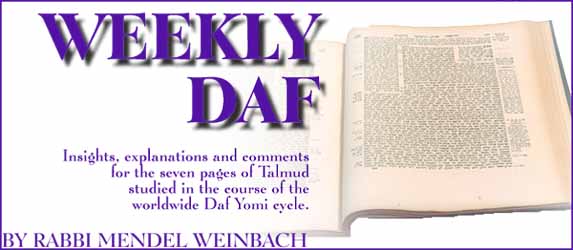Weekly Daf #51
Bava Basra 100 - 106 - Issue #51
24 - 30 Shevat 5755 / 25 - 31 January 1995
O.B.M. by his children, grandchildren and greatgrandchildren
This publication is also available in the following formats:
![]()
![]()
![]() Explanation of these symbols
Explanation of these symbols

| The Case: | Two brothers, Reuven and Shimon inherit six fields from their father. Unaware that they have a brother in a distant land they divide the estate equally, each taking three fields. Then Levi appears, establishes his identity as a brother and makes a claim for his share of the estate. The sages Rav and Shmuel disagree as to the proper course of action - invalidation of the original division in favor of a new division among all three brothers or leaving the first division intact but requiring Reuven and Shimon to each give one of their inherited fields to Levi. |
| The Rule: | Rav's opinion is accepted as law. The original division is invalidated and all three brothers must draw lots to determine which fields belong to them. |
| The Problem: | The law says that had Reuven and Shimon known of Levi's existence and divided the inheritance into three parts before a three-man court without Levi's consent he would not have been able to invalidate this division. If Levi's consent is not necessary why do we invalidate the division made in our case? |
| The Resolution: | In the case where they knew about Levi they properly divided the inheritance into three parts. Levi's lack of consent is insignificant because in any event he would have to submit to a drawing of lots. But where they were unaware of Levi and divided the inheritance into only two parts each brother received more than the share due to him and this division is therefore null and void. |
Walking The Land, Paving The Way

Avraham Avinu was commanded by Hashem to walk the length and breadth of Eretz Yisrael which was being presented to him as a gift. The majority view of the Sages rejects the opinion of Rabbi Eliezer that this is proof that one who acquires a field can finalize the transaction by simply walking upon it. Their view is that one can only render a transaction irrevocable by demonstrating his ownership through making some improvement in the land. Avraham Avinu's walking was for a different purpose - to pave the way for his descendants to easily conquer the land.
This is best understood by applying our sages' principle of "Whatever happened to the forefathers happened to their descendants" which Ramban elaborates upon in his commentary on Chumash. The walking of Avraham is symbolic sovereignty which transforms in the future to concrete conquest by Joshua.
General Editor: Rabbi Moshe Newman
Production Design: Lev Seltzer
HTML Design: Eli Ballon, Michael Treblow
© 1995 Ohr Somayach International - All rights reserved. This publication may be distributed to another person intact without prior permission. We also encourage you to include this material in other publications, such as synagogue newsletters. However, we ask that you contact us beforehand for permission, and then send us a sample issue.
This publication is available via E-Mail
Ohr Somayach Institutions is an international network of Yeshivot and outreach centers, with branches in North America, Europe, South Africa and South America. The Central Campus in Jerusalem provides a full range of educational services for over 685 full-time students.
The Jewish Learning Exchange (JLE) of Ohr Somayach offers summer and winter programs in Israel that attract hundreds of university students from around the world for 3 to 8 weeks of study and touring.
Ohr Somayach's Web site is hosted by TeamGenesis
Dedication opportunities are available for Weekly Daf. Please contact us for details.







